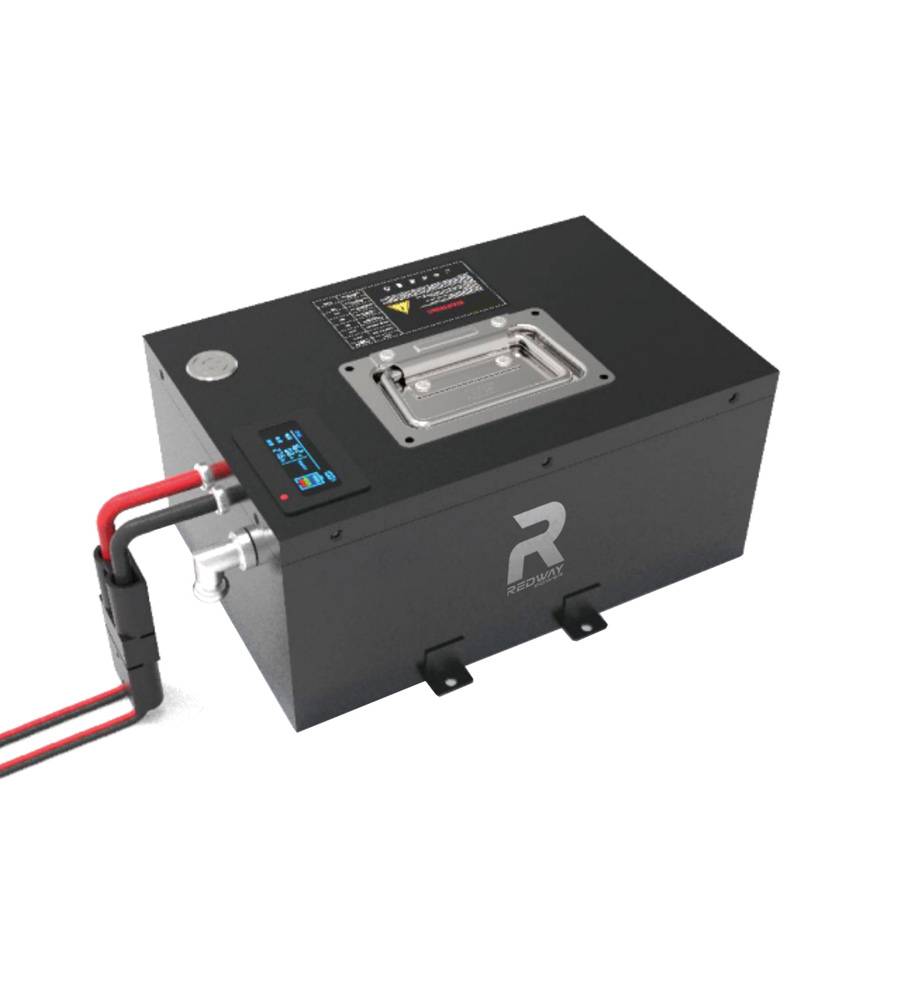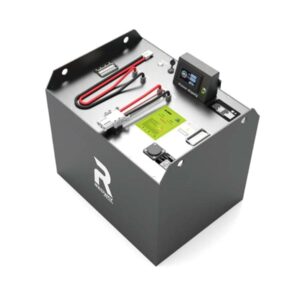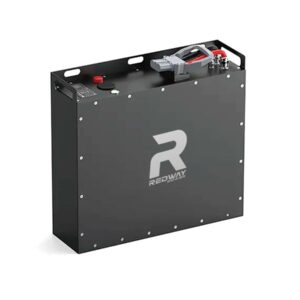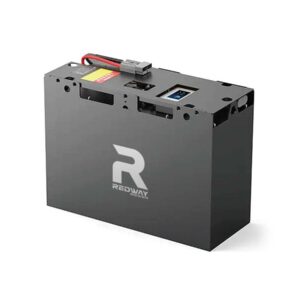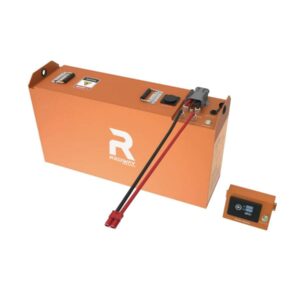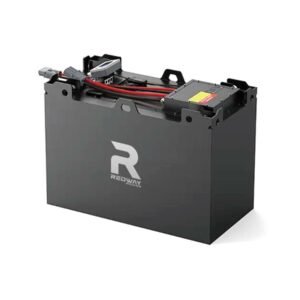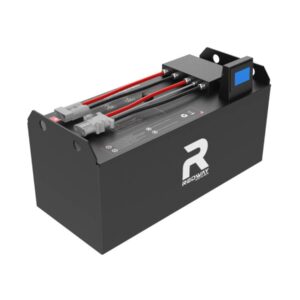Description
Introducing the 24V 60Ah Lithium Iron Phosphate (LiFePO4) Forklift Battery, a powerful and efficient energy solution designed for material handling and light industrial applications. This advanced battery offers outstanding energy efficiency, durability, and safety, making it an ideal choice for OEM, ODM, and wholesale buyers looking for reliable power solutions.
- High Energy Capacity: Provides a nominal voltage of 24V and a capacity of 60Ah, delivering an energy output of 1440Wh for extended operation.
- Long Cycle Life: Designed to exceed 2000 cycles at 80% Depth of Discharge (DoD), significantly reducing replacement costs compared to traditional lead-acid batteries.
- Compact and Lightweight Design: Weighing only 15 kg with dimensions of 520mm x 269mm x 208mm, this battery is easy to install in various forklift models.
- Robust Safety Features: Equipped with a built-in Battery Management System (BMS) that protects against overcharging, overheating, and short circuits for safe operation.
- Wide Operating Temperature Range: Functions efficiently in temperatures from -20°C to 60°C, making it suitable for diverse working environments.
Product Description
The 24V 60Ah Forklift Lithium Battery is engineered to provide reliable power for a variety of material handling applications:
- Energy Output:
- This lithium iron phosphate battery operates at a nominal voltage of 24V, ensuring exceptional energy density and efficiency.
- Delivers an energy output of approximately 1440Wh, making it ideal for forklifts and other industrial equipment.
- Compact Design:
- Measuring approximately 520mm x 269mm x 208mm and weighing around 15 kg, this battery is designed to fit into tight spaces without compromising performance.
- Its lightweight design allows for easy integration into small electric forklifts, enhancing operational flexibility.
- Efficient Power Management:
- Supports a maximum continuous charge current of 30A, ensuring quick recharging and efficient energy delivery during operations.
- This capability minimizes downtime, allowing for continuous operation even in busy environments.
- Low Maintenance Requirements:
- The lithium technology eliminates the need for watering and reduces maintenance compared to traditional lead-acid batteries.
- Users can expect minimal upkeep while enjoying reliable performance throughout the battery’s lifespan.
- Durability and Reliability:
- With an IP65 rating, this battery is protected against dust and water ingress, making it suitable for challenging environments.
- Its robust construction ensures that it can withstand the rigors of demanding work environments, whether indoors or outdoors.
- Communication Capabilities:
- Integrated RS485 and CAN-bus communication protocols enable real-time monitoring of battery performance metrics.
- Ideal for fleet management systems, allowing operators to track battery health and optimize usage patterns effectively.
Investing in the 24V 60Ah LiFePO4 Forklift Battery not only provides a dependable power source but also supports sustainability efforts with its long lifespan and eco-friendly design. This battery is an excellent choice for warehouse fleets and bulk buyers looking for long-term power solutions.Contact us today to explore customization options and bulk purchasing benefits! Experience the advantages of working with a trusted Chinese manufacturer dedicated to quality and customer satisfaction. Whether you require bulk orders or tailored solutions, we are here to support your business with our expertise in LiFePO4 batteries.
LiFePO4 Battery Specifications and Performance
What are 24V 60Ah LiFePO4 forklift battery specifications?
A 24V 60Ah LiFePO4 forklift battery typically offers a voltage of 24V and a capacity of 60Ah. It features high energy density, lightweight design, and extended cycle life, providing efficient and reliable performance in industrial settings.
Charging time for 24V 60Ah LiFePO4 forklift batteries?
Charging time for a 24V 60Ah LiFePO4 forklift battery typically takes 2 to 3 hours with a suitable charger, depending on the charger’s power output.
Cycle life expectancy of 24V 60Ah LiFePO4 batteries?
The cycle life expectancy of 24V 60Ah LiFePO4 batteries is approximately 2,000 to 5,000 cycles, depending on usage conditions, offering significantly longer service life compared to lead-acid batteries.
Applications suited for 24V 60Ah LiFePO4 forklift batteries?
These batteries are ideal for electric forklifts, material handling equipment, and other industrial machinery requiring high reliability, long run times, and quick recharging in warehouses or distribution centers.
Safety and Certifications
Safety certifications for 24V LiFePO4 forklift batteries?
24V LiFePO4 forklift batteries typically hold certifications like UL, CE, and UN38.3, ensuring they meet global safety standards for transportation and usage in industrial environments.
What certifications do top Chinese LiFePO4 OEMs hold?
Top Chinese LiFePO4 OEMs typically hold certifications such as ISO 9001, UL, CE, and UN38.3, indicating compliance with international safety, quality, and environmental standards.
Are lithium forklift batteries safe and certified?
Yes, lithium forklift batteries are safe when manufactured according to international safety standards. They are certified with UL, CE, and other relevant certifications, ensuring their safe operation and use.
Chinese LiFePO4 Suppliers
How do Chinese LiFePO4 suppliers ensure competitive pricing?
Chinese LiFePO4 suppliers maintain competitive pricing by leveraging cost-effective production methods, economies of scale, and local sourcing of materials, while adhering to international standards for quality and safety.
Can Chinese OEMs customize LiFePO4 battery specifications?
Yes, Chinese OEMs can customize LiFePO4 battery specifications, including voltage, capacity, and form factor, to meet specific requirements for various industrial applications and customer needs.
What quality control standards do Chinese manufacturers follow?
Chinese LiFePO4 manufacturers typically follow strict quality control standards, such as ISO 9001 and other industry certifications, ensuring that each battery meets performance, safety, and reliability criteria.
How do Chinese LiFePO4 suppliers handle international shipping logistics?
Chinese LiFePO4 suppliers manage international shipping logistics by partnering with experienced freight companies, ensuring proper packaging, documentation, and adherence to international regulations for battery transport.
Lithium vs Lead-Acid
LiFePO4’s main advantages over lead-acid?
LiFePO4 batteries offer higher energy density, longer cycle life, lighter weight, and faster charging times compared to lead-acid batteries, providing superior performance and lower total cost of ownership.
Why LiFePO4 has longer cycle life than lead-acid?
LiFePO4 batteries have a longer cycle life due to their stable chemistry and ability to handle more charge-discharge cycles without degradation, unlike lead-acid batteries, which deteriorate faster over time.
How LiFePO4 energy density compares to lead-acid?
LiFePO4 batteries have a higher energy density than lead-acid, meaning they store more energy in less space, providing longer runtime and more efficient use of energy for the same volume.
What makes LiFePO4 lighter than lead-acid batteries?
LiFePO4 batteries are lighter than lead-acid batteries because they use lithium iron phosphate as a cathode material, which is much less dense than lead, reducing overall weight.
Why LiFePO4 handles high temps better than lead-acid?
LiFePO4 batteries perform better in high temperatures due to their stable chemical structure, which resists thermal runaway, unlike lead-acid batteries, which can overheat and degrade more easily under extreme conditions.
Do LiFePO4 batteries require less maintenance than lead-acid?
Yes, LiFePO4 batteries require less maintenance than lead-acid batteries. They do not require regular watering, equalization charging, or extensive upkeep, reducing maintenance time and costs.
Forklift Battery Efficiency and Maintenance
Key advantages of lithium forklift batteries?
Lithium forklift batteries offer high energy density, fast charging, low maintenance, and longer lifespan, making them ideal for efficient, cost-effective operations in warehouses and material handling.
How do Li-ion batteries enhance warehouse efficiency?
Li-ion batteries enable faster charging and longer operational times, reducing downtime and increasing forklift availability. Their lighter weight improves maneuverability and productivity within warehouses.
Maintenance best practices for lithium forklift batteries?
To maintain lithium forklift batteries, ensure proper charging (avoid overcharging), clean terminals, store in a dry, cool place, and monitor battery health regularly through an onboard management system.
Future trends in lithium battery warehouse applications?
Future trends include higher energy density batteries, advanced battery management systems, wireless charging, and integration with IoT technology for real-time battery performance monitoring and optimization.
Battery Charging and Storage
What are safe charging steps for forklift lithium batteries?
To safely charge forklift lithium batteries, use a charger designed for lithium-ion batteries, avoid overcharging, monitor charging cycles, and ensure proper ventilation during the process.
How to optimize lithium battery charging cycles lifespan?
To optimize lithium battery lifespan, avoid frequent deep discharges, charge before reaching very low levels, and use slow or moderate charging speeds rather than rapid chargers when possible.
What maintenance ensures proper lithium battery storage?
Store lithium batteries in a cool, dry location with a state of charge between 30%-50%. Avoid extreme temperatures and humidity, and regularly check the battery’s voltage and health.
How to prevent overcharging in industrial forklift batteries?
Prevent overcharging by using a battery management system (BMS) that monitors voltage and current, and by ensuring chargers automatically stop charging once the battery reaches full capacity.
What temperature ranges suit lithium battery charging?
Lithium forklift batteries should be charged in temperatures between 32°F (0°C) and 113°F (45°C). Charging outside this range may damage the battery or reduce its lifespan.
How does fast charging affect lithium battery health?
Frequent fast charging can increase heat generation and stress on the battery, potentially shortening its lifespan. To maintain health, opt for moderate or standard charging whenever possible.

